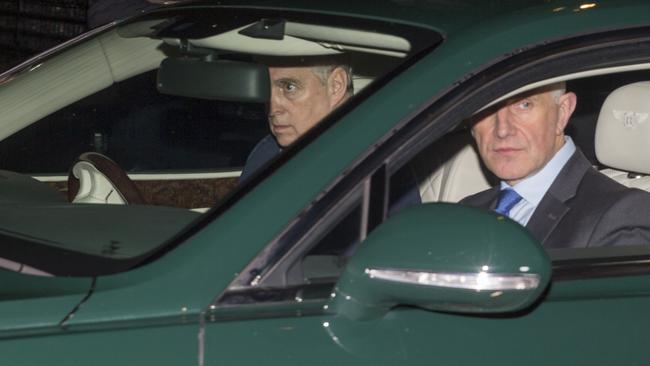Andrew faces losing armed guards after royal withdrawal
Prince Andrew’s entitlement to taxpayer-funded protection is being reassessed after he was forced to step down from royal duties.

The Duke of York could lose his armed police bodyguard in a security review prompted by his withdrawal from public duties.
Prince Andrew’s entitlement to taxpayer-funded protection is being reassessed after he was forced to step down from royal engagements after a BBC interview in November about his links with the sex offender Jeffrey Epstein.
The review comes at a time when the budget for protecting the royals is soaring and Scotland Yard has been struggling to train enough close protection officers to meet the demand.
The Times revealed that the Metropolitan Police has not been able to raise the number of officers in its royalty and special protection command – covering royals, ministers and diplomats – from 449 to a recommended 540.

There is also concern at the Met over the cost incurred in providing round-the-clock protection for the Duke and Duchess of Sussex during their recent seven-week stay in Canada. Security budgets are at the centre of discussions over their future.
Harry, 35, and Meghan, 38, had claimed the legal status of “internationally protected people” but dropped that as it became clear it would not apply if they were living privately in Canada and not performing an official function.
Virginia Roberts Giuffre, who claims she had sex with Prince Andrew when she was a teenager, has written an accusatory message on social media seemingly aimed at Andrew, Ghislaine Maxwell and Naomi Campbell.
She wrote: “You saw me at your parties, you saw me in Epstein’s homes, you saw me on the plane, you saw me get my haircut, you saw me on the streets, you watched me be abused. You saw me!” Her message was accompanied by hashtags directed at the duke; Ms Maxwell, the socialite and former girlfriend of Epstein; and Ms Campbell, the model.
Andrew has denied that he had sex with Ms Guiffre and Ms Maxwell denies wrongdoing. There is no suggestion Ms Campbell was involved in or aware of any impropriety involving Epstein.
The duke’s position has been discussed by the royal and VIP executive committee (Ravec), the secretive Whitehall body that decides who receives protection and at what level of security. The committee is said to have recommended downgrading Andrew’s security but this would require the approval of Priti Patel, the home secretary, and could face opposition from Buckingham Palace.
A security source said: “It is often much harder to remove someone’s security than to put it in place – they get used to it, they don’t like being without it. Ravec wanted to remove Princess Eugenie’s security when she was at Newcastle University in 2009. Andrew was furious about the move and went to the Queen who played the trump card and the security was maintained.”
Eugenie, whose security detail when she was at university cost an estimated £250,000 per year, and her sister, Princess Beatrice, lost their official protection two years later. Andrew is understood to pay privately for a continuing security detail for his daughters.
The level of protection afforded to Andrew, 59, will inevitably be reduced because he will not be carrying out official duties. If he travels overseas with his Pitch@Palace business he is likely to have to finance his own security.
However, he will still benefit from police guards when he is in the company of other senior royals and when at his home on the Windsor estate which has permanent security arrangements.
“The Met’s priority has to be protecting the line of succession,” one former protection officer said. “However, there remains a level of threat to other royals and there has to be vigilance. I anticipate his security will be reduced rather than removed entirely.”
Regarding Harry and Meghan’s security arrangements when they are in Canada, a former senior police officer said: “People don’t seem to realise that the Met has no powers overseas, officers need negotiated permission to operate in any capacity and they have to have the support of the local force. British protection officers are very rarely allowed to carry their firearms in another country, the armed support usually has to be provided by the force in that country.”
The mayor of London’s policing office reported that flight costs for Met protection officers rose from £3.47 million in 2016-17 to £4.62 million in 2018-19. Hotel costs increased from £1.1 million to £2 million in the same period. The Home Office, the Met and Buckingham Palace declined to comment, saying that security arrangements for individuals were never discussed publicly.
The Times







To join the conversation, please log in. Don't have an account? Register
Join the conversation, you are commenting as Logout